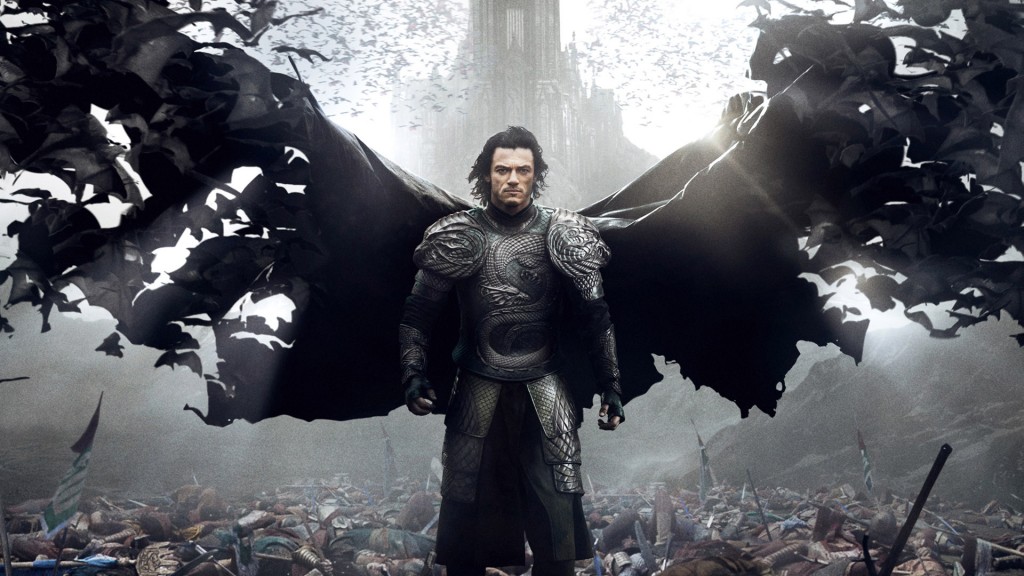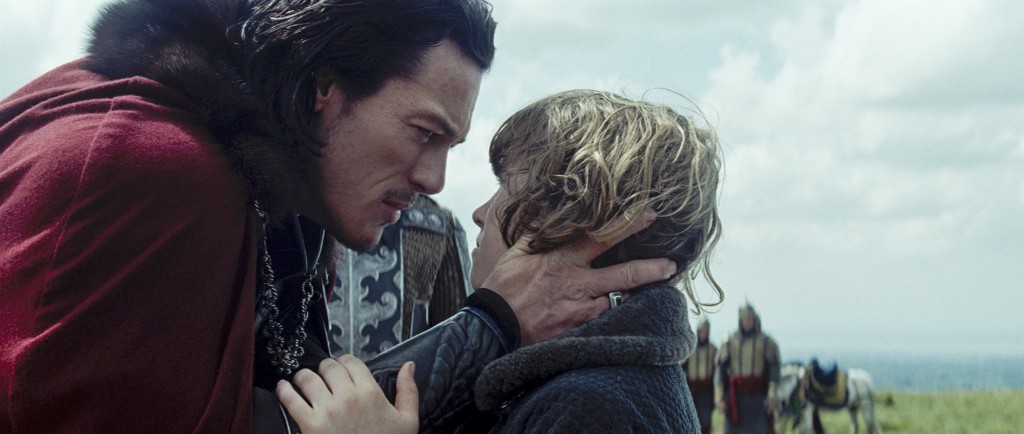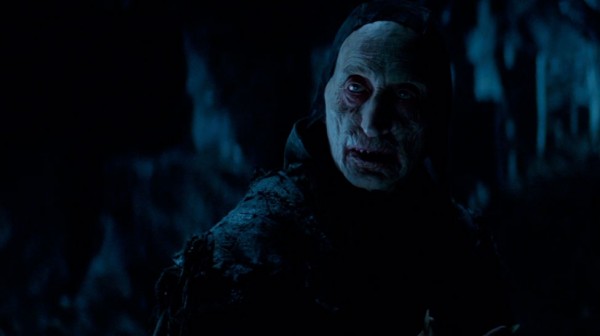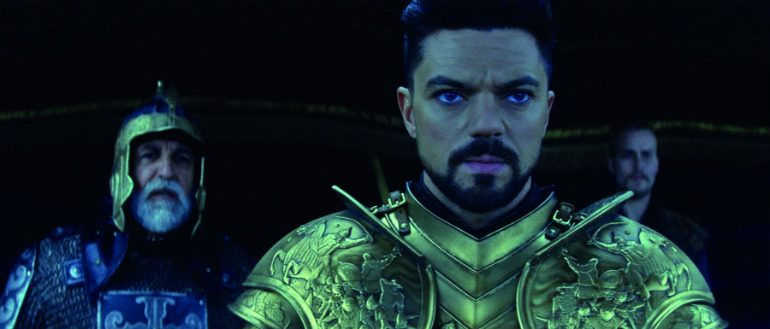By JoJo Seames
Since first appearing in Bram Stoker’s 1897 epistolary gothic novel, Dracula has remained one of the most popular and enduring characters in Western literature. The vampire count taps into certain primal and universal feelings, but is versatile enough to suit a wide range of story types, themes, and moods. I’ll admit to being skeptical from the first moments of Dracula Untold, seeing the title of this first film from director Gary Shore; the phrase “Dracula Untold” promises the origin story of a character who actually requires no exact backstory, and who perhaps even benefits as a character through retaining that certain air of mystery. However, I tried to keep an open mind.
As a directorial debut, the film is unambitious. The plot structure is fairly by-the-numbers, and the cyan-tinted picture is well-lit and slickly polished, in the prevailing style of the day. In the mood and editing, and in a great many camera shots, one can see the unmistakable influence of The Lord of the Rings and, very especially, 300, and this movie is firmly a pseudo-historical fantasy, rather than a gothic horror tale. To its credit, the supernatural effects are well-animated, and the monstrous designs and transformations are appealing and dignified—a rare feat for monster flicks, where the effects naturally gravitate towards the schlocky in even some of the finest examples of the genre. Ramin Djawadi’s score is serviceable, though not memorable. A nice font was chosen for the end credits. That faint praise being said, this movie is as dumb as a bag of rocks, and about as entertaining.
The film centers around actual historical figure Vlad III, Prince of Wallachia, better known to history as Vlad Tepes—Vlad the Impaler—who served as one of the inspirations for Bram Stoker’s book. Dracula Untold presupposes that the Transylvanian prince became an undead creature of the night during a series of events loosely inspired by the actual conflicts with the forces of the Ottoman Empire in the 15th century. The film thus sets three goals for itself: to be a historical drama, to be a dark character study, and to be a fantasy about a certain familiar supernatural character. Unfortunately, it fails wretchedly at all three.
Spoilers about ahead. Read on freely, and of your own will.
The plot is a kind of grandiose dick-measuring contest between Vlad Tepes (played by Luke Evans) and Sultan Mehmed II (played by Dominic Cooper), wherein Vlad refuses to pay a tribute that would formally acknowledge his country as being part of the Ottoman Empire. The result is a clash of armies in the Borgo Pass. Untold opts to spice up the politics with the personal, giving Vlad a preteen son (named Ingeras, and played by Art Parkinson, who shares Evans’ trait of looking perpetually worried) whom Mehmed demands to have conscripted into his army along with a thousand other Transylvanian boys. This provokes some sort of underplayed outrage from Vlad, who himself spent his teenage years as a political hostage of the Ottomans, and the boy’s fate provides something for the single female character, wife Mirena (I assume so named because it sounds a little bit like the novel’s “Mina”, and played by Sarah Gadon) to fret over throughout the movie.
Historicity seems of little concern to the filmmakers. In a movie that doesn’t ever use the word “Wallachia” to describe the location of its conflict, one feels that there is an expectation that the audience is both ignorant and uncaring of little things like world history. It chooses, instead, to hew to a kind of generic medieval high fantasy template. (In fact, Luke Evans’ Dracula is styled almost exactly as he is as Bard the Bowman in Peter Jackson’s The Hobbit trilogy.)
The prince’s personal history is also apparently not worth exploring, as he undergoes absolutely no character development whatsoever. The movie makes the choice to reveal that he was once known as The Impaler in previous military struggles, rather than to depict how he became the sort of person who could earn this a fearsome reputation. There’s a notion that the character desires to have moved past that aspect of his life, because that’s how movies work, but there’s never an actual dealing with the meat of the subject.
Vlad’s character is defined by plot convenience. He is (coolly) affectionate with his family so that the audience might find him sympathetic. He expresses no remorse or doubt over his bloody past actions so that the Master Vampire will think him a worthy candidate for vampirism. But there are no scenes that explore his thoughts, his feelings, or his ideology beyond the plot-necessitating belief that the ends justify the means.
When Vlad becomes a vampire, the film again forgoes the opportunity for character development. There is no change in personality. No lack of affection for his family. The newfound thirst for blood is entirely a literal one. And Evans opts not to bring anything to the characterization through his performance.
As lightly sketched as the central character is, the supporting cast is even more loosely defined. Young Ingeras is bright-eyed and button-nosed, and is obediently passed around where he’s needed. Mirena is a patient Penelope of a wife, existing as a pale idol to be sacrificed at the film’s climactic moments and provide the hero with a last motivation for violent action. Mehmed is vaguely proud and vaguely condescending. And the rest of the warriors and emissaries that filter through the film don’t do much else but exist.
The character of the otherwise-unnamed Master Vampire (played in a pleasingly creepy manner by Charles Dance) adds a strange, frustrating wrinkle to the film, as his presence creates a Dracula film wherein Dracula isn’t the Dracula, but there’s still a Dracula. The Master Vampire is a semi-feral-yet-erudite Orlock-type, pale and pointy, who turns Vlad un-dead, and helpfully explains this movie’s rules of vampirism, and the time window wherein the prince could potentially regain his humanity before being doomed forever. There’s some vague notion that Vlad’s turning could be the engine to free the Master Vampire from…his cave?…but it’s never followed up on. I found it disappointing that here, Dracula, THE vampire, gets his position reduced. There’s someone bigger and battier than him out there. It’s The Itchy & Scratchy & Poochie Show. It’s the spinosaurus from Jurassic Park III. It’s every xtreme new character in a 90s comic book here to prove that these ain’t your granny’s funnybooks. But this bit of the film is also the thing that I wish the entire movie actually was: it’s something recognizable as a Dracula, according to the general understanding of how Dracula behaves garnered from having seen any other depiction of the character.
Similarly disappointing, Vlad’s struggle with his new nature is not exactly the Faustian bargain one wishes to see. There’s no moment of comeuppance, no sick realization that the power he craved has come at a terrible price. Nor is it a spectacular, Lucifer-like fall from Grace, middle fingers raised high in unholy salute on the way down to Hell. Aside from an ultimately meaningless moment of distrust by the villagers, there are really no downsides to being a vampire here, except for having to avoid silver and sunlight instead of all other forms of death. Vlad is portrayed as neither a particularly devout nor fanatical Christian, so he undergoes no spiritual concerns over his new life change. His wife is amazingly fine with the whole affair. He wants to kill people, but brutal murder is unquestionably Not Really A Bad Thing in the world of this film, and he’s got these sick-ass superpowers now to kill people with, so, really, why wouldn’t he?
All in all, Vlad is very passive for supposedly being a character who is so famous for his inexorable willpower. Even having some sort of cultish servant-type isn’t of Dracula’s own doing, here. The other classic Dracula attributes–arrogance, entitlement, possessiveness, ambition–are similarly not on display. And most egregiously departing from the entire point of the established character, in Dracula Untold, the vampirism is entirely divorced from the concept of sexuality.
In Dracula Untold, the creators seem to be operating from the viewpoint of engaging with Dracula not as a literary agent for meaning through metaphor, but rather as though he were an asset in a game: a set of statistics, whose abilities can be utilized to further a (militant) goal. It’s a film where, of no aspect, was the question ever put forth: Why?
The movie moves relentlessly through its paces of bat-clouded battles, devoid of all meaning save for its admonition that the death and devilry will somehow save the boy, and —more importantly —save face, and so will ultimately be Worth It.
As unscary, unspooky, and un-anything-resembling-the-source-material this movie actually is, its overall message is a chilling one, though I think inadvertently. Its might-makes-right attitude is especially disturbing considering that this is a story of a pale European Christian heroes facing conquest by a Middle Eastern —and explicitly and pointedly Islamic —opposing force (whom, I feel it should be mentioned, are played almost entirely by white actors in swarthy makeup).
The final resolution sees Dracula a triumphant hero. He has saved his son, and his people, and if this was all done at the expense of his own immortal soul, the film shall shed no tears over the fact. Even Dracula’s final giving-in to the vampiric desire for blood is presented as a valorous action, necessary to save the day. As his dying wife insists that he drink her blood to achieve vampire strength eternal, the movie portrays such an act of violence against this woman as something she literally asked for, and is even an act of love and respect for her. That’s some kind of serial killer logic, there. And the movie’s absolutely baffling conclusion solidifies this violence against her as something which has no adverse effect on their relationship whatsoever.
Regardless of the movie’s disinterest in the inherent symbolism of the vampire’s bite as a specifically sexual violence, the basic meaning behind it all remains. Cannibalism is necessarily an ultimate act of objectification, a view of other people as so much less than human, or oneself so much more so, that others exist for one’s own consumption. Vampire stories provide a wonderful channel to explore, among other matters, the ways in which we fear and desire to be objectified, or to objectify others. Even Dracula Untold, for all its effort, cannot entirely escape the power of its own basic subject matter.
Some ham-fisted speechifying about how what the world needs sometimes is a monster is firmly in line with a contemporary trend of revisionist literature as regards villains. These Sympathetic Psychopath stories seek to validate the character’s actions and recast selfish, unkind, and even cruel behaviors as understandable and even laudable. Does their popularity appeal to an audience’s desire to be always in the right, to use and hurt others without consequence, to live without empathy for others in society? Are we so morally subjective that we can’t suggest that a man who would impale thousands of other people on spears might not always be an admirable figure, no matter which side of a geopolitical conflict he might represent?
This movie left me depressed and angry. In asking the audience to thoroughly sympathize with a character who has been so often used in literature as a symbol of evil incarnate, this movie exists as cynical and soulless. Rather than examine new questions concerning familiar themes, we’re to be content with polished action sequences for their own sake alone, in a film put together as though following some book promising How To Make Your Own Movie In Just Twelve Easy-To-Follow Steps.
“But what if bad…was actually good?” Well, what if. What if this movie was actually any good? Then that premise might be somewhat interesting.
Dracula Untold is in theaters now.
JoJo Seames is a comics writer and illustrator, a fine art painter, and a film analysis podcaster. She lives in a cold and lonely moorland, working on her books, including The Makeshift Man, Monster Plus, and a webcomic adaptation of The Castle of Otranto. She can be haunted at JoJoSeames.com.





If your looking for a good action flick with a decent plot this is the movie for you. With a 90min runtime I was expecting this movie to feel “rushed”, it felt far from that. The action was great, it did not disappoint with all the cool vampire abilities you see in the trailer, especially transforming into a group of bats. Being a Dracula movie there are things you have to expect, yes he receives his power by drinking blood, having all the vulnerabilities as every vampire (which they do very good in this movie) but the way this movie makes you root for Vlad(Dracula) you actually find yourself engulfed in the movie wanting him to overcome the darkness and win. However if you are a history buff and it irks you when movies take real life people and change their history for a movie, you will not enjoy this because it is loosely based off Vlad the Impaler. My Review 8/10 Excellent